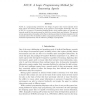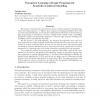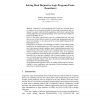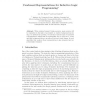1055 search results - page 70 / 211 » On the Semantics of Logic Programs with Preferences |
EPIA
1997
Springer
14 years 1 months ago
1997
Springer
Argumentation semantics in extended logic programming has been defined in [5,12] for a single agent which determines its believes by an internal argumentation process. In this pap...
CORR
2004
Springer
13 years 8 months ago
2004
Springer
FLUX is a programming method for the design of agents that reason logically about their actions and sensor information in the presence of incomplete knowledge. The core of FLUX is...
CORR
2011
Springer
13 years 18 days ago
2011
Springer
We propose a logical/mathematical framework for statistical parameter learning of parameterized logic programs, i.e. de
nite clause programs containing probabilistic facts with a ...
AGP
2003
IEEE
14 years 2 months ago
2003
IEEE
Disjunctive Logic Programming (DLP) under the consistent answer set semantics is an advanced formalism for knowledge representation and reasoning. It is, under widely believed assu...
KR
2004
Springer
14 years 2 months ago
2004
Springer
When mining frequent Datalog queries, many queries will be equivalent in the light of an implicit or explicit background knowledge. To alleviate the problem, we introduce various t...




